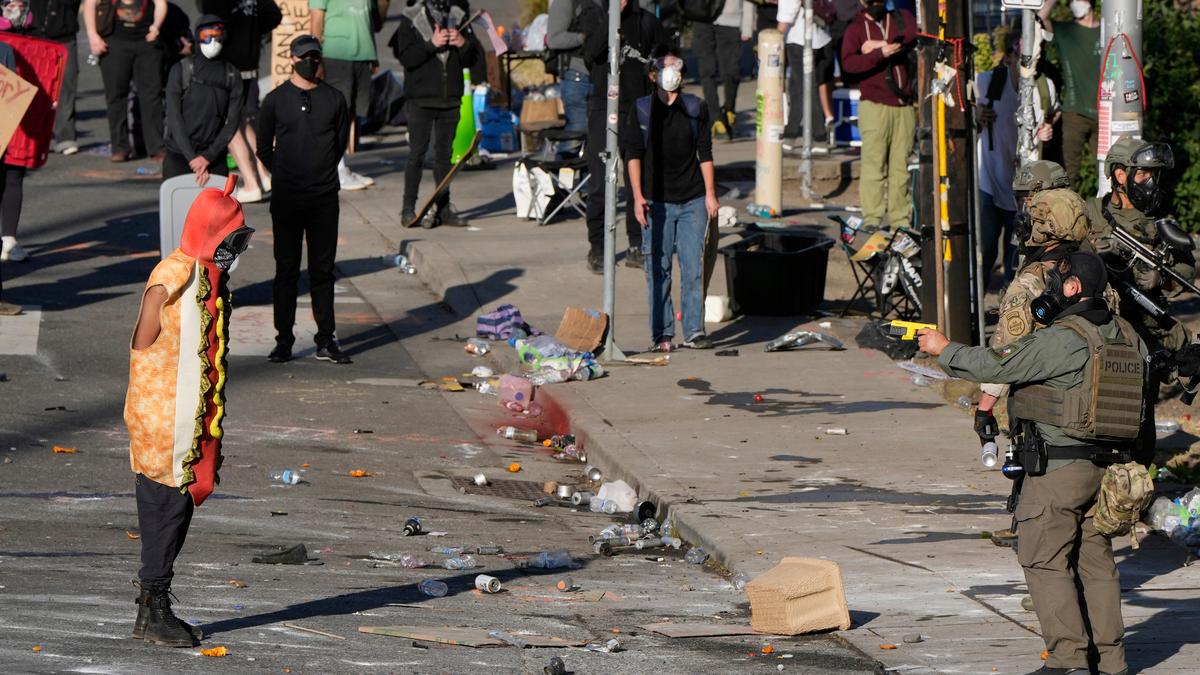President Donald Trump has said that he will send troops to Portland, “authorising Full Force, if necessary” to handle “domestic terrorists” as he expands his deployments to more American cities.
Oregon Democratic Gov. Tina Kotek responded by saying Mr. Trump is abusing his authority by ordering troops to the a city, which she said is doing “just fine” on its own.
Mr. Trump made his announcement on social media on Saturday (September 27, 2025), writing that he was directing the Department of Defence to “provide all necessary Troops to protect War ravaged Portland”. Mr. Trump said the decision was necessary to protect U.S. Immigration and Customs Enforcement facilities, which he alleged is “under siege from attack by Antifa, and other domestic terrorists”.
The White House did not immediately respond to a request for details on Mr. Trump’s announcement, such as a timeline for the deployment or what troops would be involved.
In an afternoon news conference, Ms. Kotek said she directly told Mr. Trump earlier in the day that troops are not needed and she believes he does not have the authority to deploy the military there.
“We can manage our own local public safety needs. There is no insurrection. There is no threat to national security,” Ms. Kotek told reporters.
Portland’s Mayor, Democrat Keith Wilson, also said there is no need for troops: “Our nation has a long memory of acts of oppression, and the president will not find lawlessness or violence here unless he plans to perpetrate it.” Early Saturday, there was no sign of any federal presence in the city’s downtown, where people jogged along the Willamette River, relaxed by a riverside fountain or rode bikes on a sunny fall day.
“Where’s the emergency?” asked resident Allen Schmertzler, 72, who said he was “disgusted” by the President’s decision.
Another resident, John McNeur, 74, called Mr. Trump’s statement “ridiculous”. He pointed out that he was taking “a leisurely stroll” along the river on a peaceful, sunny day.
“This place is not a city that’s out of control,” he said. “It’s just a beautiful place.”
Mr. Trump previously threatened to send the National Guard into Chicago but has yet to follow through. A deployment in Memphis, Tennessee, is expected soon and will include only about 150 troops, far less than were sent to the District of Columbia for Mr. Trump’s crackdown on crime or in Los Angeles in response to immigration protests that turned violent with the troops’ arrival. Trump also sent Marines to Los Angeles.
In Memphis, about 80 to 100 people marched to a plaza in front of City Hall to protest the expected arrival next week of the guard and more than a dozen federal law enforcement agencies, ranging from immigration to drug enforcement.
Protesters held signs with messages such as “Resources Not Task Forces” and “Memphis don’t need no occupation, Memphis don’t need no government control” — a play on the Pink Floyd song “Another Brick in the Wall”.
Speakers at a news conference beforehand said that instead of federal troops and law enforcement agents, the city needs more funding for education, crime prevention, youth services and hospitals.
Pentagon spokesman Sean Parnell said the Department of Defence would provide information and updates when available.
“We stand ready to mobilise US military personnel in support of DHS operations in Portland at the President’s direction,” Mr. Parnell said.
But Gov. Tina Kotek, a Democrat, said there is “no national security threat” in Portland.
“Our communities are safe and calm,” Ms. Kotek said.
A spokesperson for the Oregon National Guard, Lt. Col. Stephen Bomar, said in an email that “no official requests have been received at this time” for Guard support. “Any requests would need to be coordinated through the Governor’s office,” he added.
Oregon’s congressional delegation, with the exception of GOP Rep. Cliff Bentz, demanded that the Trump administration keep federal agents and troops out of Portland.
“This unilateral action represents an abuse of executive authority, seeks to incite violence, and undermines the constitutional balance of power between the federal government and states,” the Democratic lawmakers wrote in a letter to Trump, Defence Secretary Pete Hegseth and Homeland Security Secretary Kristi Noem.
Portland, population 6,36,000, was also the site of long-running and sometimes violent racial justice protests following George Floyd’s murder by Minneapolis police in 2020. The Trump administration sent hundreds of agents, including from the U.S. Border Patrol, for the stated purpose of protecting the federal courthouse and other federal property from vandalism.
Recent protests have been far more muted and focused on the area around the ICE building, located outside the city’s downtown that was the heart of the 2020 protests. The building’s main entrance and ground-floor windows have been boarded up and tagged with graffiti.
Earlier this month, the city said it would issue a land use violation notice to the city’s U.S. Immigration and Customs Enforcement building because it had been used to detain people overnight or for more than 12 hours — violations of its conditional land use approval.
Portland is one of a number of so-called sanctuary cities. There is no strict definition for sanctuary cities, but the term generally describes places that limit cooperation with Immigration and Customs Enforcement.
Since the September 10 assassination of conservative activist Charlie Kirk, Mr. Trump has escalated his efforts to confront what he calls the “radical left”, which he blames for the country’s problems with political violence.
Published – September 28, 2025 07:07 am IST
